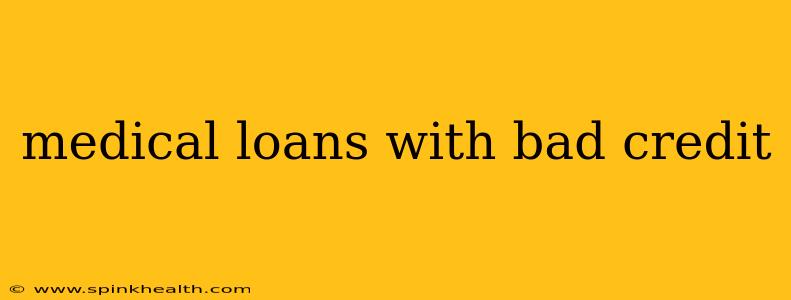Navigating the Labyrinth: Securing Medical Loans with Bad Credit
The unexpected illness or injury can strike at any time, leaving you reeling not only from the physical pain but also from the financial burden of medical bills. This is especially true if you find yourself facing a mountain of debt and a less-than-perfect credit score. The thought of securing a medical loan with bad credit can seem daunting, like navigating a labyrinth with no map. But don’t despair! This guide will illuminate the path, offering strategies and insights to help you access the financial assistance you need.
My name is Sarah, and I've spent years helping individuals just like you find their way through the complexities of healthcare financing. I've witnessed firsthand the stress and anxiety associated with medical debt, and I’m here to share my expertise and empower you to take control of your financial future.
What are my options for medical loans with bad credit?
This is the most pressing question on many people's minds. The truth is, securing a loan with bad credit is tougher than with good credit, but it's not impossible. Your options include:
-
Personal Loans: Many lenders offer personal loans, even with less-than-stellar credit. However, expect higher interest rates to compensate for the increased risk. Shop around and compare offers from different banks and credit unions. Online lenders are also an option, but be sure to research their reputation carefully.
-
Medical Credit Cards: These cards are designed specifically for medical expenses. While they often come with high interest rates, they might be more accessible than traditional personal loans if your credit is severely damaged. Again, careful comparison shopping is crucial.
-
Credit Unions: Credit unions often have more lenient lending criteria than traditional banks, making them a potentially valuable resource for individuals with bad credit. They may offer more personalized service and potentially better rates.
-
Debt Consolidation Loans: If your medical debt is part of a larger debt problem, a debt consolidation loan might help you simplify payments and potentially secure a lower interest rate. This option will need careful analysis to see if it truly benefits you in the long run.
-
Payment Plans with Healthcare Providers: Directly negotiating a payment plan with your healthcare provider or hospital is often the first step. They might offer flexible payment options or even reduce the overall bill. Don’t hesitate to ask!
How can I improve my chances of getting approved for a medical loan?
Improving your odds starts with understanding the lender's perspective. They assess your creditworthiness based on various factors. Here's what you can do:
-
Check your credit report: Before applying for any loan, obtain your credit report and address any errors. A clean report can significantly improve your chances.
-
Improve your credit score: This takes time and discipline, but it's worthwhile. Pay down existing debts, make payments on time, and keep your credit utilization low.
-
Provide a co-signer: A co-signer with good credit can greatly increase your chances of approval. This person assumes responsibility for the loan if you default.
-
Demonstrate stable income: Lenders look for proof of steady income to ensure you can make your payments. Prepare your pay stubs and tax returns.
What interest rates can I expect with bad credit?
Interest rates for medical loans with bad credit are significantly higher than for those with good credit. You can anticipate rates ranging from 15% to 30% or even higher. It's essential to carefully compare offers from multiple lenders to secure the best possible rate.
What are the potential risks of taking out a medical loan with bad credit?
Taking out a loan with bad credit can lead to a cycle of debt if not managed carefully. High interest rates can make repayments difficult, and defaulting on the loan can severely damage your credit further. Thoroughly understand the terms and conditions before signing any loan agreement.
Are there any alternatives to medical loans for financing medical expenses?
Exploring all your options is crucial. Consider:
-
Crowdfunding: Platforms like GoFundMe can help you raise money from friends, family, and even strangers.
-
Healthcare charities: Many non-profit organizations provide financial assistance for medical expenses.
-
Government assistance programs: Investigate federal and state programs that might offer help.
Securing a medical loan with bad credit requires careful planning and proactive steps. While the process might seem challenging, remember that with research, determination, and a clear financial plan, you can overcome the obstacles and gain access to the funds you need for your healthcare. Don’t hesitate to seek professional financial advice to guide you through the process. Your health and financial well-being are paramount, and taking control of your situation is the first step towards a brighter future.

